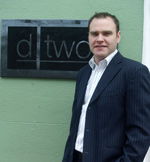Barney McGill – ‘heir to the overdraft’
For example, while working in the family business, the INIA’s new Chairman took the trouble to get a degree in Business & Tourism Management at Cathal Brugha Street, followin it with a post-grad in Athlone Tech.
All through college though he helped in his family’s Harcourt Street hotel, bar and nightclub business.
Back then, the Harcourt Hotel used host the biggest and best trad scene at the time with stars like Sharon Shannon playing regularly as did Damien Dempsey and Christy Moore.
“Since then a lot has dramtaically changed” he says, “what with the smoking ban, more stringent drink-driving laws and the general approach to alcohol. It’s a whole different ball game today requiring pubs and clubs to adapt.
“Now it’s by DJ and current chart music, so we’ve gone full-circle in terms of what we were or what we are now although we did have Daniel O Donnell singing here last weekend..”.
Barney has focused on the bar and nightclub business for most of the past 13 years.
Have times for the nightclub industry ever been tougher than in these cash-constrained times?
He thinks not.
“I talked about it with friends and colleagues” he says, “and we reckon that six or seven nightclubs have closed in the locality.
“If you compare the nightclub industry today and five years ago, it’s chalk and cheese. Five years ago it wasn’t a question of ‘Will the customers be there?’ but ‘Will we have enough staff to cope with the demand?’. The worry now is, how are we going to look after our staff and will they have a job going forward?
“Customers have become very aware of what constitutes ‘good service’. From that perspective we as publicans and nightclub operators have no choice but to lift our game. Those that haven’t managed to do so are finding it that bit more difficult.
European context
“It seems to be a very uneven kind of industry if compared to certain other parts of the country or other countries in Europe what with different closing hours etc. We’ve no choice but to work with the Gardai and the legislation that’s there. It’s true, we’re on a bit of a knife-edge.”
He also points to the tourism implications: “There’s a huge element of tourists looking for something more than just the Irish pub but looking for an element of nightlife that they’re used to in their own countries,” he explains, “Is it a fair question to ask, ‘Do we compete on their level?’ and when the general tourist is asked on a night out what they think of our nightlife, they’re saying, ‘It’s 2.30am and they’re closing the clubs and we want to come in!’.
“Generally speaking, tourism is of fantastic benefit for the country and it doesn’t have to exclude nightclubs. Why must nightclubs be such that we can’t get the full benefit of the nightclubbing tourist that other countries seem to be able to serve?”
Late-night pubs and clubs
In this, the nightclub sector finds itself in partial conflict with the licensed trade over the late night economy where the late-night pub must compete with everbody else.
Barney’s not so sure.
“Ireland has always had both a pub and club culture that co-existed very well,” he explains, “I don’t believe it’s conflict, I believe it’s competition – competitive times have called for competitive measures. Competition is healthy and will seperate the great from the good but both the pub and the club must compete on a level playing field.”
He understands any lack of sympathy for the nightclub from the late-night pub. Everybody wants to open later.
“Dublin nightclubs want to function as part of a European capital city but have to subsist in what some might call ‘the Stone Age’ – or compare what Dublin can do versus Kilkenny for example in terms of competing on the same grounds vis-a-vis opening or closing times.
“I suppose for the times that are in it, everybody’s looking to hold onto their customers for as long as they can.
“If both the pub and nightclub are compliant on every aspect of the law that governs them then it’s down to customer choice!”
Late-night bars and clubs have much in common.
He suggests that if there was cohesion between bars and nightclubs it would allow them all to raise trade levels.
SEOs not worth their salt
“The cost of SEOs has almost doubled,” he points out, “And with the further restrictions on closing times in some parts of the country, it seems to be getting to the point that many club owners will be asking themselves, ‘What’s the point in paying €440 for an SEO to open for just one extra hour?’ in some cases. In other cases club owners are happy to pay for the SEO but are looking for transparant receipt of that fact – a Pay and Dispaly system if you will… A local Judge in Waterford has introduced this as a requirement locally. Perhaps this should be looked at from a National perspective?”.
He cites the decrease in the number of SEOs granted in recent years: 91,157 in 2006; 90,691 in 2007; 78,711 in 2008; 64,011 in 2009; 64,878 in 2010 – and provisional figures for 2011 indicate just 53,837 SEOs granted.
“The 2011 provisional figure received from the Courts Service shows a 17 per cent decline nationwide in SEOs 2011 v 2010,” he says, “The figures for Dublin are even more stark, showing a 25.6 per cent decline for the same period (from 26,961 to 20,049).”
Alternatively, take as an indication the number of INIA members today at 300 compared to 500 three or four years ago.
“If that was to be translated into SEOs, it’s significant,” he says.
Sequential closing times
Barney believes sequential closing times offer another option for nightclubs.
“Sequential closing times would make more sense” he argues, “it’s hard to look for a level playing field if you don’t have this. That was always going to be the difference between a pub and a nightclub.
“Takeaways and taxis are able to better cope with this and the Gardai would probably benefit without 10,000 people spilling out onto the street all at the same time.”
Getting customers in
Marketing the nightclub has changed greatly too since Barney began.
Even his local butcher has a Facebook page now.
“It’s people looking at other people, not just young people. Social networking and the ability to tap into the younger customers has become so focused on technology that it’s not about picking up a flier or advertising on the local billboard any more but direct marketing hits and the ability to communicate with your customers.
“The older person who doesn’t understand social media is going to be at a considerable disadvantage when running his club if he doesn’t have a marketing department that’s wise to this new phenomenon.”
As for his year in office, Barney intends to keep three targets firmly front of mind: regenerate footfall, lower SEO costs and have his members better manage risk under models not dissimilar to Nightsafe, launched two years ago.
Barney McGill will need all his business acumen to do this, but a lifetime’s experience should be there to back him up.
 Barney McGill – “Sequential closing times would make more sense. It’s hard to look for a level playing field if you don’t have this. That was always going to be the difference between a pub and a nightclub.”
Barney McGill – “Sequential closing times would make more sense. It’s hard to look for a level playing field if you don’t have this. That was always going to be the difference between a pub and a nightclub.”








